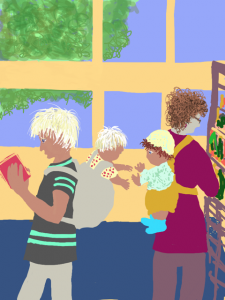On the necessity for programs to meet social needs in cities
What with more than half of the world’s population now living in cities and this proportion on the increase there is deep concern about how to meet the social needs of urban dwellers. Among these concerns are ‘unlivable social divides among groups’ and the social isolation and associated loneliness which are pervasive in cities.
Conversare is a new social technology which could contribute to alleviating these. For it is about bringing conversation into life in public places- face-to-face conversational connecting (partly with a stranger) in contexts co-created by social artists in which everyone engages well with others present, no matter who they are.
Anyone is welcome to attend events which, with the right support and leadership, will become widely available and readily accessible in places which have the feel of being ‘little havens of old fashioned good will.’ Among these are cafes, restaurants, pubs, hotels, community centres in local neighbourhoods.
See recent posts for more insights into the nature and significance of these features.
Here we look at reports which indicate that, while innovative approaches are urgently required to address these two major issues, ‘very little along these lines has been done.’
Social cohesion
“For as long as we have had cities, we have had inequities in access to social and environmental resources among urban citizens. Cities cannot be more livable nor support sustainability without policies that work on both unsustainable overconsumption in the city and unlivable social divides among groups. This is not an impossible innovation – just a difficult one and one we have never tried.” (My emphasis)
Carolyn Stephens. London School of Hygiene and Tropical Medicine and National University of Tucuman, Argentina.
In: Scientific American. Special Issue. September 2011. Cities – better, smarter, greener.
‘We have seen a brighter future, and it is urban’
Page 70 Street Talk: Survey respondents weigh in to make any city more livable
Social Cities
A recent report by the Grattan Institute in Melbourne entitled Social Cities suggests that:
Humans are social animals: relationships are critical to our wellbeing.
http://grattan.edu.au/publications/reports/post/social-cities/
Innate connecting …
And indicates that “Isolation and loneliness pose an increasing threat to the health of Australians, many of whom are cut off from friends and locals by ill-conceived urban design.”
“…although social networks are better in Australia than many countries, friendships and neighbourhood connections have diminished over the past two decades, and the changing population means these trends could worsen.” … “A lack of face-to-face contact can put our health at risk.” And that “Unfortunately, there are worrying signs that isolation and loneliness are growing in Australia.”
Furthermore, that the very nature of urban design exacerbates the lack of opportunity for face to face social contact. For much of the design of dwellings, in urban and suburban settings (often with electronically controlled roller doors), means few means by which people ‘bump into’ others in the course of their everyday lives.
In a commentary on the Social Cities report the statement is made:
“Without relationships we wither – individually and collectively … It’s now recognised that loneliness is up there with high blood pressure, lack of exercise, obesity, and smoking as an indicator of shortened life expectancy.”
See also: The Conversation on Loneliness on the rise as our cities atomise http://theconversation.edu.au/loneliness-on-the-rise-as-our-cities-atomise-6068
Missing links
The report on Social Cities pays only cursory attention to what to do about these issues. On ways to diminish social isolation, said the author, the Grattan Institute’s Program Director of Cities, Jane-Frances Kelly:
“Public spaces such as parks and squares, and places for social activities such as community centres, sports grounds, cafes and shops, having more park benches or turning unused housing lots into small parks can make cities friendlier places to live.”
These are well and good but only part of the answer, in my opinion. For if people are to connect well with others they may not know there has to be both places and programs which support this. By programs I mean organised opportunities to meet and talk to each other. Conversare events are one such, social events in which everybody present is ‘the entertainment’ through being a participant rather than a spectator.
Ms Kelly adds:
“Improving social connection [in cities] is not necessarily hard or costly … big returns can come from small outlays.”
To reiterate from Ms Stephens:
“This is not an impossible innovation – just a difficult one and one we have never tried.”
I wonder if you see the potential of this one way to address these ‘missing links’?
Alan Stewart
Adelaide



Recent Comments